#but it had to be the one I used XD
Text
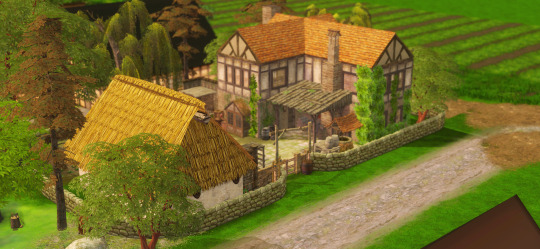
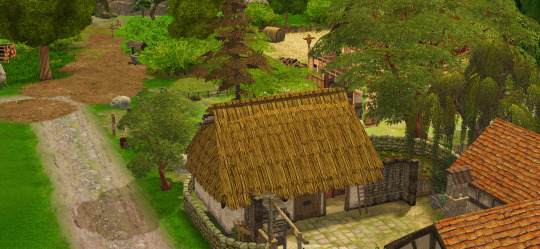
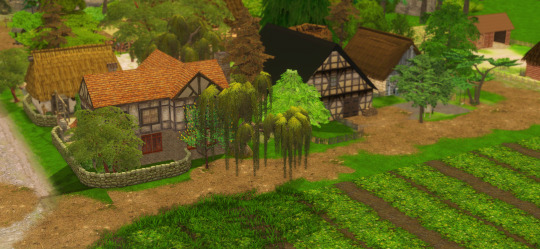
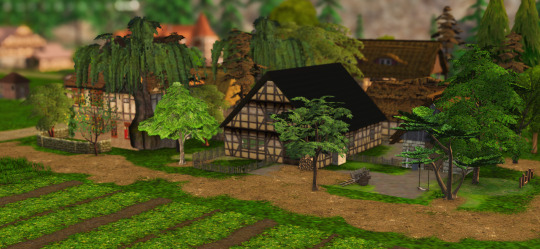
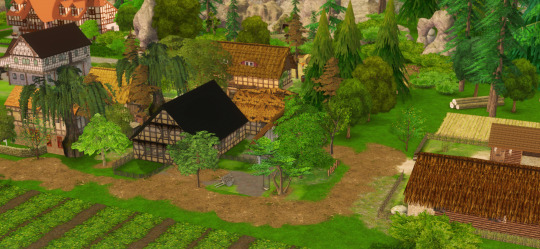
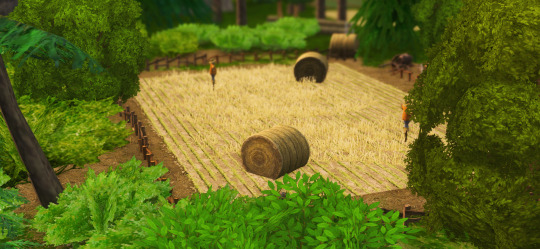
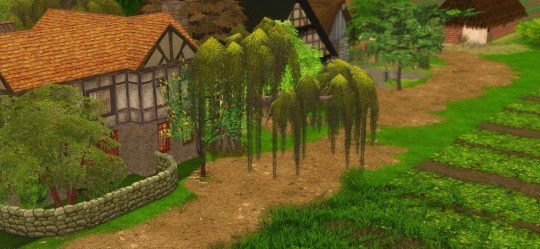
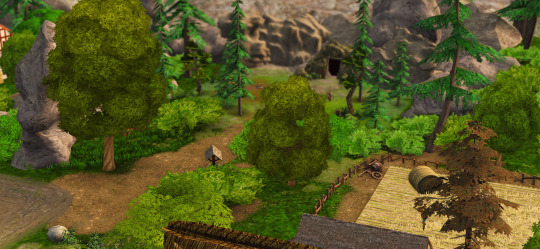
#ts2#i'm just chilling#i got a new computer and i'm just testing sims 2#maybe something will come out of it or maybe not we will see#i'm remaking my hood againn because i had too many hopes for my previous computer#now the hood is smaller#no pink flashing as of now where i had a lot of it before i decorated what i have here now#i havent been around a lot when the tumblr channged recently#im getting lost#i posted this before on my side blong without noticing at 1st#the lots i used aren't mine#my decorating is still all around the place(it doesnt make sense) and kinda meh#but since its put together enough to snap some pretty pictures then i'm happy#i want to stick to one hood but my old computer always forced me to give up xD#where have i been? baldurs gate :>
245 notes
·
View notes
Text
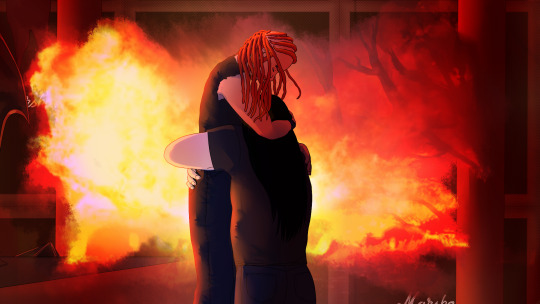

Comfort hug is the best hug, change my mind.
I actually meant to make this a bit softer and calmer, but the day the colorings were done my c-ptsd kicked in (i am better now dw), and so this went into the direction of tragicer and brutaler.
Pickles IS standing on the sofa, because Nathan needed holding too.
The events of aotd is a still-fading memory inside their home.
God I loved this movie.
With this, I officially finished my stock. SO, I welcome ideas you want to share with me, even in dms, as a request or option to redraw as nickels! ^^ (I might not do them all, I already have sum in my pocket, but it's never bad to have some ideas to reach back to)
#mtl#metalocalypse#pickles the drummer#nathan explosion#nickels#mtl fanart#metalocalypse fanart#dethklok fanart#I actually used up some actual pictures for this one's background#not proud of it#but it somehow fit and I had no heart changing it.#aotd#metalocalypse aotd#post aotd#i know you're looking at his ass. my allo friend pre-checked it. stop it xd
146 notes
·
View notes
Text
@thatlesbainmushroom and @jjlovesgoodies (hope you don't mind the tags, I was not sure how else to make sure you seen this<3) both said yes to hearing about my roomies zombie au, so here it is!! Though, I must admit that it is more of a half-baked idea than a fully thought out au. I'm not sure if I will ever actually write it, so it's free game with credit.
I suppose a TW is required before you read any further. It is a zombie au, so it is pretty grim. Mentions of death, blood, injury, and other apocalypse typical things.
Etho and Cleo were college roommates before everything went to shit. Cleo was a graphic design and arts student in her fourth year, while Etho was an engineering student in his second year. They have been together since the start, and were actually in their dorm room when the chaos started. Bdubs used to be with them, but they lost track of him (and his horse) months ago. They assume he is dead.
Grian was a first year architect student from a few towns over. His group consisted of his roommates, Jimmy and Joel, along with his work friend, Scar.
None of them had ever used a gun before the apocalypse, so it is none of their preferred weapon. Cleo has a baseball bat, Grian has a knife, and Etho has a machete. Etho and Grian both carry handguns but rarely use them. Cleo knows how to use a gun but does not carry one and would have to be in mortal danger to be convinced to use it.
Cleo is immune to the bite, something they found out at the beginning because a classmate had bitten her and she never turned. Though, this immunity would not hold any narrative weight. The world has fallen apart, there wouldn't be anyone left to try to find a cure from her anyway. They are just focused on surviving and trying to keep each other safe.
However, because of her immunity, she does take risks that Etho doesn't/can't. She used to be a real softy, not much a fighter who was all bark no bite, but she would do anything to protect Etho. She has many scars, from bites and scratches, because of this reckless behavior.
It would start with Grian having just been separated from his group and he's been wandering around the remains of a big city looking for them. He eventually gets overwhelmed by a hoard and ends up cornered in an alley, where he is then saved by Etho, who kills the zombies and offers to bring him back to his camp.
Grian says no and tells him he has to keep looking for his group, but Etho is persistent. Grian caves and agrees to go with him when Etho offers to help look for his missing friends; no strings attached.
The group traverses the remains of the burning world together for several months looking for Grian's group and slowly getting to know each other. Etho and Cleo share information freely, but Grian is more reserved. He only answers simple questions about his past. They barley know anything about this group they are trying to find. Instead of opening up as the months' pass by, he actually becomes more and more reserved.
He keeps asking why they keep helping him when they have no obligation to do so, especially since he's given them next to no information or reason to trust him, and they say why not? They don't have anything better to do than lend him a helping hand.
Grian leads them more and more northwest as time goes on, telling them that he was told to head in this direction to meet back up with his group, but still, they find no trace of them.
Around 6-7 months into traveling together, the group do a supply run in a mall that they thought was safe and end up getting trapped inside with no way out after Grian brings some kind of a display/structure down on top of himself on accident and it attracts a hoard that was hidden away out of sight.
They are very low on ammo, Etho was bit while getting Grian out from under the display, Grian was injured by the accident, and they're all too exhausted and malnourished to fight. They make it into a staff area, but there's no exit that they see, so they barricade the door. It is only a matter of time before the hoard breaks through.
Sitting inside of the small room, Grian admits to them that his group was already dead and had been for a while. He tells them that he had actually been ready to die that day Etho found him. He felt bad letting Etho's kindness (which was a rarity in this dying world) go to waste, so he went along with it.
He was just along for the ride at first, leading them on a wild goose chase while waiting for a chance to leave them, but then he grew to care for them. He never thought he would find friends again in a world like this, but, somehow, he did. They gave him a purpose, a reason to keep going. They made him want to live again. They made him happy. They made him laugh; something so simple and yet so important.
He didn't want them to leave him behind once they found out the truth, so he'd kept lying to them and pretending like he was still searching so that they would have a reason to keep helping him, a reason to have him around.
He was closing himself off all that time in an attempt to hold onto the one good thing in his life. He tells them that he's sorry, that he loves them, and that he's scared.
Cleo and Etho say they don't care that he's been lying, and that he's just as important to them as they are to him. They say that whatever happens next, they'll do it together.
And then in my mind it would end somewhat ambiguously/open ended as the zombie's break through.
#grian#zombiecleo#ethoslab#the roomies#secret life roomies#secret life#hermitcraft#I had it in my mind that they would call the zombies “boogies” as a reference to the boogie man curse#but i was worried people might find too silly XD#in my mind bdubs is still alive somewhere#found and taken in by the mounders I imagine#and they eventually meet back up with him if the ending is a good one#cw: death#implied death#zombie apocalypse#apocalypse au#if you want a happy ending then they use the rest of their ammo to hold off the zombies#and are able to find a way out in time and it turns out that etho is also immune#or if you want sad but not too sad they make it out but etho is not immune so he grows sick#and he dies after a heartfelt goodbye and grian + Cleo burry him somewhere nice#or a more realistic ending to the situation they ended up in they die in each others arms#really it can go any way that you want#tell me if i should tag this as anything else!#oh also as for the “display” I wasn't sure how to explain it#I am imagining some sort of gazebo/stall that he kicks the support beam of thinking it is secure#and it comes down on top of him#but my words are not the best
85 notes
·
View notes
Text
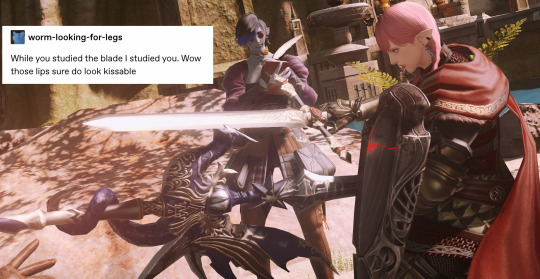
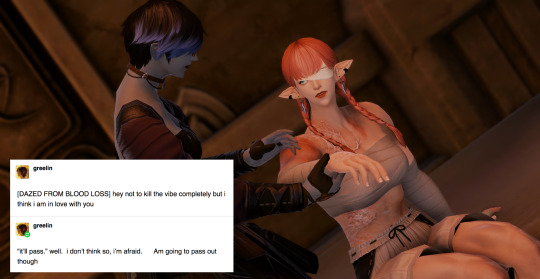
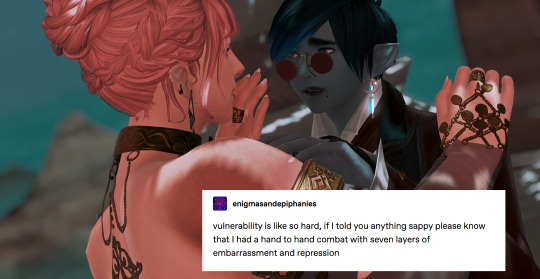
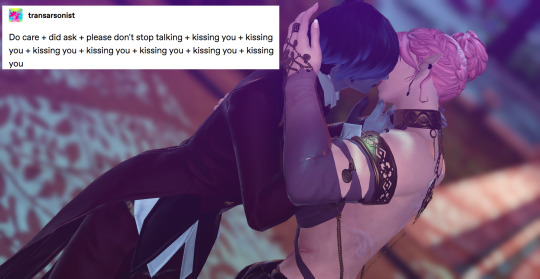
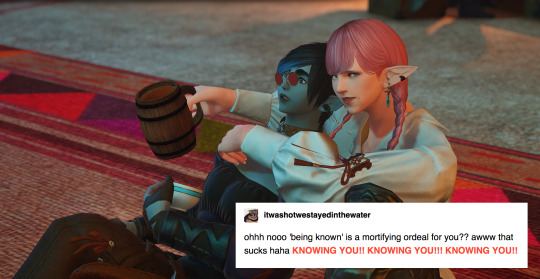
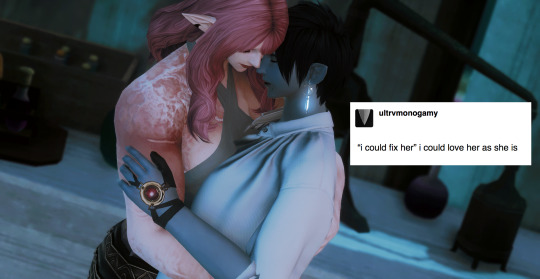
WoLs + text posts: Aryaille x Yloise
@yloiseconeillants
#ffxiv wol#wol x wol#text post meme#yloise coneillants#aryaille nox#au: many paths entwined#finally doing something with my giant stash of text post screenshots#homegrown memes#using all screens I already had EXCEPT for the first one- made that one specifically for this XD
60 notes
·
View notes
Note
Big shot Spamton being flirty but failing on the attempt, pathetically.
(Ps. I take this opportunity to say I love your art! It's very inspiring for me and I bet for others too. ^∇^)💖💖
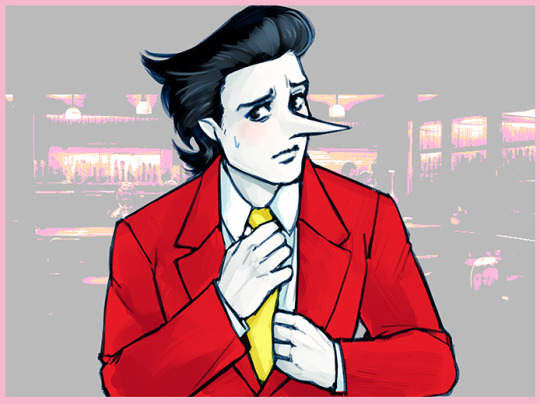


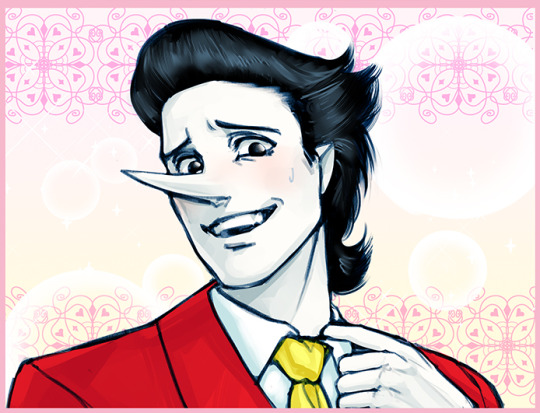






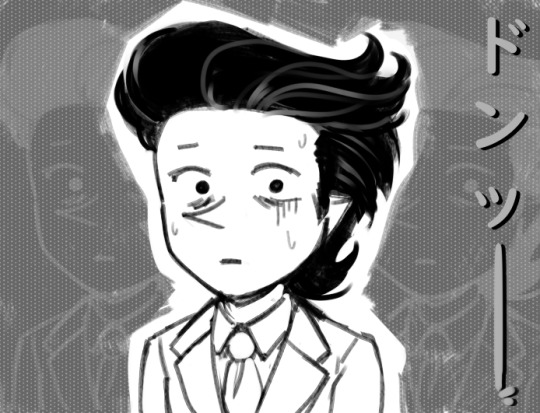
Credit:
Text Box Generator
(Thank you for the compliment! (⁀ᗢ⁀))
#my art#ask answered#answered#spamton g spamton#spamton#big shot spamton#big shot era#deltarune#This should have been done weeks ago but I've had too much crap happen#I'm pretty amused how this one turned out#poor pathetic man/pos#idk who to pick as a subject of his flirting so feel free to use your imagination XD#I just imagine it as some pretty stranger#not anyone that would stick around in his life unfortunately!
92 notes
·
View notes
Text
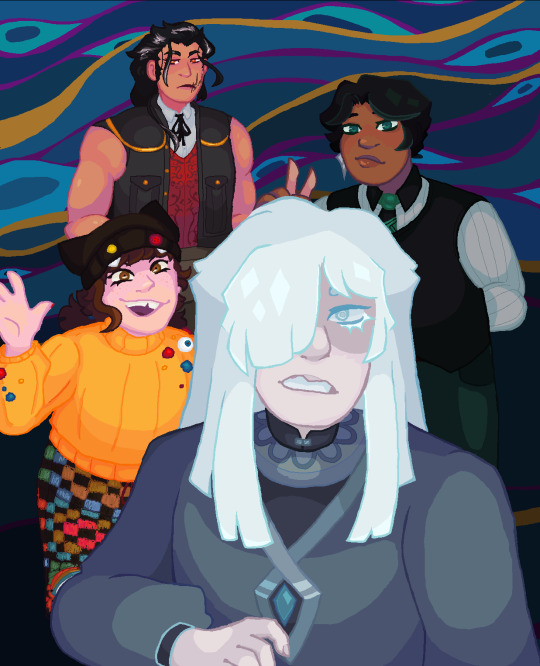
Photographer unknown, as well as his fate.
I had way more passion going into this, but then it kinda fizzled away, so they look like they're missing something ^^" though it made me consider studying up some light values and perspectives which is progress I'd say xD (but I'll show you what I mean in the next art post hopefully 👀)
Please forgive me the creative librety of Making Katja more edgy and putting a hat on Erissa (i have no emotional tie to her yet, therefore i think you deserve a hat (cuz she had it in her concept sometimes and i was like--- yo, wouldn't that be a nice touch!))--- i was too lazy to experiment with the crocheting so--- it looks the way it does ^^"
Also, thanks y'all for the support under the last art I posted! It means a lot to me hearing that you like what I am doing ^^
#ssoblr#sso#starstable online#star stable#dark riders#ms paint#art#or like... am i allowed to use this tag?#fanart#sso fanart#i hope i captured Sabine's greasy hair right#i actually think it's supposed to be a braid?#like a really tight one#who braids her hair?? i need to know#also#the background is supposed to be garnok coded#but i dislike it had to be pink >:(#therefore it isn't xD
81 notes
·
View notes
Text
I got new headphones 😅
wearing them I feel like I look like this lol

#they are pink :)#but yeah they are pretty big at least way bigger than the ones I had before XD#will get used to them eventually lol#my ramblings
184 notes
·
View notes
Text
"Guns for Hands" with every first beat removed
#twenty one pilots#guns for hands#second beat song#music#every other beat#every second beat#song#another I had to use my alternate methods with#because of that fucking bridge lol xD#it did surprisingly well with it honestly
204 notes
·
View notes
Photo

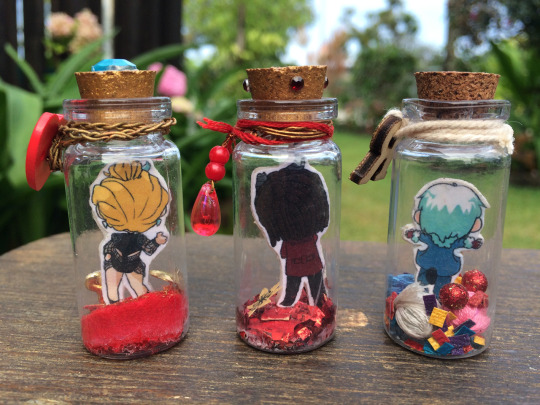

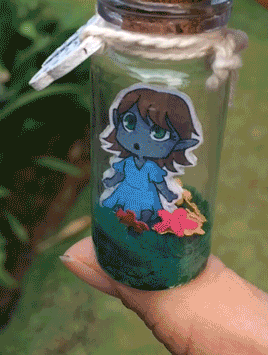
2022 Xmas card trades were mini shaker bottles!...because past!Me decided to randomly buy some. Can you see the common thread between all my craft projects XDD These were actually pretty quick to put together all things considering (which was great cos I started them really late lol).
Pro tip never use plastic bottles like I did because ugh they scratch so easily.
Made from: Mini plastic bottles, craft paper, pipecleaner, felt, beads, buttons, thread, matchsticks, random scrapbooking bits and bobs
#art#crafts#bottle keychain#craft trade#christmas card trade#gifts for friends#christmas 2022#oc diarama#of sorts lol#miniature#shaker keychain#these things arent actually keychains but i did attach little keychain straps to them later for no reason#bottle craft#if i were to do these again i would def use glass bottles instead#because jesus christ the SCRATCHING#i had to do gato's one twice cos of accidents with superglue and tweezers |D;#in a turn of events i managed to send all of these out so everyone actually got them by xmas!!! \o/#now i know approximate timing for mailing lMAO#except canada as per USUAL XD;#sz
463 notes
·
View notes
Text
Honestly can't get over the three springs quests, in that link and hylia held multiple, actual conversations, where hylia asked him to check on the mother statue, he explained the situation, and she thanked him and asked for a dragon piece again, that the offering might boost her power and she could send it through to the big statue. That, and the bargainer statue possessing her plateau statue, implies a really weird relationship between hylia and her idols.
Like anyone listening to link about it would be like,
Link: and then I found my first sages will! I had no idea what it was for at the time, hylia had mentioned it but she never explained -
Person: hold up hold up hold up. Lady hylia? The mother goddess?? Protector of hyrule???
Link, who's only ever been able to remember getting instant responses and knows zelda not hearing anything was a big deal the whole kingdom knew about:...... Yeah?
Person: lady hylia?
Link: *mildly discomfited* yes?? I mean she's busy but I keep her updated, you know? I trade the sages wills with her to enhance the vows, but like I said, I didn't know that at the time, and I'm finding these things just in chests, I'm really not sure they're corporeal enough for -
Person: can we rewind hylia talks to you??
Link, cottoning on a bit: is that not... Normal?
Person, shrieking: NO THE HYLIA STATUE COMING TO LIFE AND TALKING TO YOU ISN'T NORMAL NO ONE DOES THAT????
#loz#legend of zelda#tears of the kingdom#totk#loz totk#loz tears of the kingdom#I'm just really interested in the way hylia uses her statues because clearly its a lot more complicated than I thought in botw#Gushing about totk#But I'm so happy I got my hc confirmed and link can and will actually chat with hylia! Like to imagine he tells her stories of his journey#Keeps her updated on what her hero is doing now. Does her little low stakes fetch quests. When he talks to the big one she sounds so fond ^#No idea where she had a spare baby fi tucked away but hopefully it's inert because I've left it on a pedestal in my tarrey house XD#No adventuring for you little one until link learns to stop breaking his weapons#Like I appreciate the 30 damage sword ma'am I can just find better and strap a lynel horn on it#I like that the spring quests didn't change at least. No reason for them to.
216 notes
·
View notes
Text
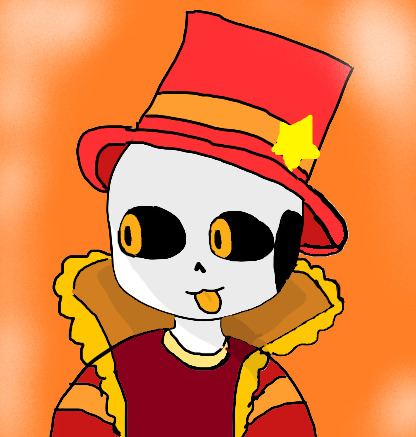
i hope his tongue is orange lol
Performance!sans [stage] by @largefound!
@randomexistingthing I forgot to tag you im sorry <3 :']]
#utmv#stage#performance!sans#my art#my posts#i sent an ask but i realized that your probably asleep XD#I used ibis paint but then I had to switch apps because the hour finished :'] [finished on 'paint 3d' aka ms paint]#ONE HOUR GOES BY QUICK WHEN YOUR DRAWING#slowly getting better at drawing skeles!
50 notes
·
View notes
Text
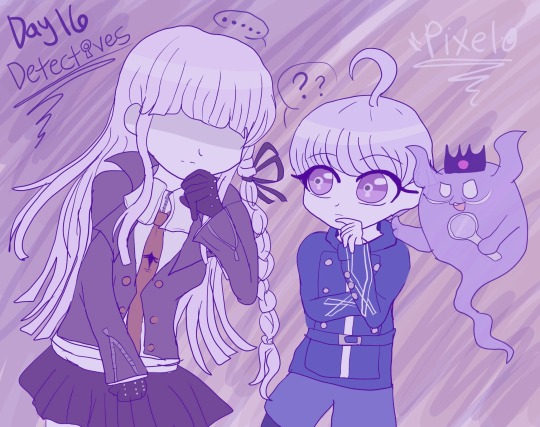
Yuma Month: Day 16: Detectives
Learning to be a Pro Amnesiac Detective 🔎
#Yuma Month 2024#rain code#master detective archives: rain code#yuma kokohead#danganronpa#kyoko kirigiri#crossover#pixeldoodles#my art#had to use the spiderverse meme for this one#yuma’s gotta learn from the best after all#what better teacher than an ultimate?#these two are so funny together#I actually headcanon them to be related#specifically him being Kyoko and Makoto’s son#he has a lot of Kyoko in him as well as Makoto xD#honestly the WDO creed is something I can see Kyoko saying#either way a trainee learning from a pro for today!!#not bad for my first attempt at drawing Kyoko c:#my favorite purple haired detectives of all time
29 notes
·
View notes
Text
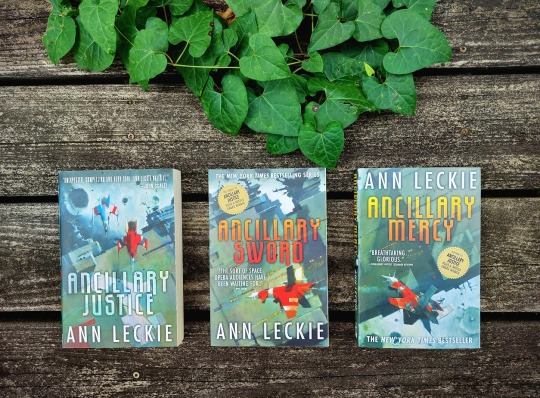
Books of 2023: IMPERIAL RADCH by Ann Leckie.
Up next! This came highly recommended by many friends (and also the internet at large when I asked for SFF revenge recs, so thanks!), and I have Tracked Down The Original Covers, so I'm ready to go.
#books#books of 2023#ann leckie#ancillary justice#ancillary sword#ancillary mercy#book photography#my photography#the first book was used and it has a signed bookplate AND it's a first edition!!!#what a find!!!#thanks HPB lol i appreciate u#....full disclosure this is another series i didn't pick up because i didn't love the covers lol#(but i dislike these covers less than the new covers......)#fortunately: the last thing i had this experience with was Murderbot and we all know how well that turned out XD#i'm also excited for POV fuckery i love fun POVs#imperial radch#did i accidentally add a trilogy and a duology (vicious) to my pre-NaNo TBR though?? yes. yes i did.#it's fine it's not even october lmao#i can read six books + one book in a month and a week right???
99 notes
·
View notes
Text
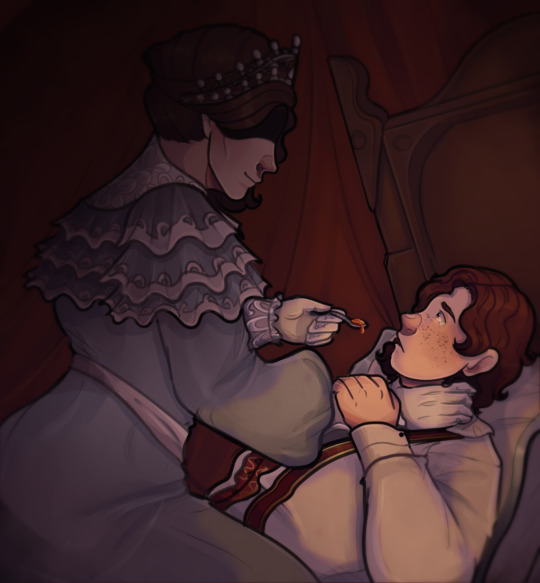
🫣 good luck with that Jam
#i had really good inspiration help with this one 🤭#tried somethin new with the lighting technique too..... wanted to really get the lighting and ominous vibes across#i feel kinda bad for this one adkdkfkfkgh#my art#oc: jamie#the captivating princess#jamie and the princess#Non-Consensual Drug Use cw#choking cw#drugs cw#ask to tag#suggestive content#ish idk XD
49 notes
·
View notes
Text
A hypothetical look at the childhoods of Carlo and Romeo
Despite Carlo and Romeo being two of the most central characters of Lies of P, what we know about their backstory is next to marginal. We know that the two of them went to school together and were best friends (perhaps even more than that), but their time in Monad Charity House is only presented in snippets and fragmented memories, and despite being highly significant, their characters remain elusive - like shadows cast over the entirety of the story, always present, never tangible.
Thus, many have filled the gaps left in their characterization with their own imagination. As for myself, I was curious what their early lives might have been like, before they met at Monad Charity House - and since it was the closest thing to the game's setting I could find, I did some research on Victorian children and their upbringing.
What I found out, however, left me absolutely shocked and made me keenly aware of just how awful Carlo and Romeo's childhood must have been, going by historic standards. As pretty much everything during the Victorian Era, a child's upbringing was very dependent on social class - however, no matter if you grew up in a rich or poor family, each came with its own kind of suffering, and regarding the question of "What were Carlo and Romeo's lives like before Monad Charity House?", the brief answer would be: "Probably not great."
As for the long answer... I should mention this is my own interpretation of Carlo and Romeo's backgrounds, and none of this is officially confirmed. However, given what we know about the two's origins, I consider it quite plausible, and what we can conclude from it might not only give us better insight into their personalities, but also some of the real-life background behind the original fairy tale of Pinocchio.
Just as a fair warning, though: This is about to get a little depressing.
[Spoilers for Lies of P!]
[CW: mentions of very questionable parenting methods, depression, suicidal ideation, poverty, parent death, child labor, abuse and exploitation of children]
Carlo
For this analysis, I'm going to assume that Carlo was born into a fairly well-off household. (The description of Carlo's portrait calls him "an aristocratic boy", and since Geppetto is the mastermind behind Krat's puppet technology, I assume he'd have his fair share of the profits.)
By the standard of their time, upper-class children were quite spoiled: Unlike their working-class peers, they never had to worry about who was going to provide food for them, and the horrors of child labor were never of any concern to them. You would think that being born into a rich family doesn't leave you a single thing to wish for - you'd have nice toys, fine clothes... and well, everything, except for parental affection.
For the most part of the day, upper-class children wouldn't even see their parents - they were only summoned to appear before them at a set hour of the day, and during these occasions, they had to address their fathers as "sir". Essentially, meeting your parents was more like an audience with a stranger, a rare privilege strictly regulated by formality. Children were expected to act prim and proper, only allowed to speak when spoken to, and thus unable to express their true feelings, thoughts, or opinions. Any show of affection was extremely rare - Winston Churchill (1874 - 1945) once remarked that he could "count the times he had been hugged by his mother" as a child.
The parents were more or less completely absent from their children's lives, and when there actually was interaction between them, the children were expected to unconditionally obey their parents. Osbert Sitwell (1892 - 1969) once commented: "Parents were aware that the child would be a nuisance and a whole bevy of servants, in addition to the complex guardianship of nursery and school rooms was necessary not so much to aid the infant as to screen him from his father or mother, except on some occasions as he could be used by them as adjuncts, toys or decorations." (Can you imagine? Geppetto taking Carlo to some big social event to show off his "perfect little son", and Carlo just standing there and silently enduring the ordeal, looking at his father all the while and wondering "Did he ever realize I'm not one of his puppets?")
So, by the standard of the time period Lies of P is set in, Geppetto neglecting his son isn't even anything terribly unusual - in fact, that's perfectly normal Victorian upper-class parent behavior.
Since they didn't take care of their children themselves, upper-class parents would hire a nanny to raise them. Nannies would be instructed what kind of behavior and morals the parents wanted instilled into their child, and they would be responsible for their education as well as teaching them manners, propriety, how to dress and so on. As such, the nanny effectively acted as a substitute for the parents - and given that maid puppets exist and Geppetto probably wouldn't let any strangers near Carlo, Carlo's nanny was most likely a puppet as well.
The daily life of upper-class children was based on strict routine - some like to say it operated with "clockwork regularity". Breakfast would be served at 8 o'clock in the morning, dinner at 12 o'clock, and tea at 6 o'clock.* Children would very seldom leave their room, except to take short walks in the park with their nanny. Education would mostly be given at home by a tutor, which included basic lessons like reading, writing, and arithmetic, but also "socially appropriate skills" like dancing and playing the piano. (Since we see a puppet giving piano lessons to a child in the intro, chances are Carlo's tutors were also puppets.)
*Eating times varied throughout the Victorian Era; a "dinner" might also be a meal eaten during midday.
The rest of the time, children would have nothing to do but to play with their toys (except on Sundays, which was forbidden). Rich families had the luxury of being able to afford the most elaborate of toys, such as automated dolls, clockwork trains, and jack-in-the-boxes, which were extremely popular among children. In fact, since clockmakers were also the ones to build toys, I could imagine Geppetto actually made the toys for Carlo himself. (However, I feel like this only would have made Carlo loathe them; in his eyes, it would've been proof that "father pays more attention to the toys he makes for me than actually looking at me".)
In short, the life of Victorian upper-class children was lonely, depressing, and stuffy to the point of suffocating. Given these circumstances, I would actually be surprised if this didn't leave mental scars on Carlo. It has been documented that a lack of parental affection causes psychological issues lasting all the way into adulthood, such as low self-esteem, trust issues, anxiety, difficulty with social relationships, and lack of emotional control. Also, considering Carlo was probably surrounded by puppet servants all day, he wouldn't even have had a single human being to interact with most of the time - something which most likely had a detrimental effect on his psyche.
Given this dreary existence, it would make absolute sense for Carlo to look nothing short of depressed in every depiction we see of him. The feeling of emptiness when being pressed into the corset of others' expectations is actually something I'm well acquainted with - it feels like walking beside yourself, like your body moving while actually feeling dead inside. A bit like a puppet on strings, if you will. With his life being a monotonous routine controlled by someone else, it wouldn't be surprising if Carlo had difficulty still seeing a purpose in it. (There have been some theories going around that Carlo committed suicide; at the very least, I think it's highly likely he had suicidal ideations during his youth.)
Perhaps this is where Pinocchio - the character from the fairy tale - might have become something like an identification figure for Carlo. Pinocchio was a puppet, but instead of doing what his creator intended - what his father expected - he did whatever he wanted. I'm sure Geppetto gave him the book as a measure to educate him, but it ended up having the opposite effect. In fact, it might have been what first taught him the concept of freedom: Geppetto's puppets only ever did what he told them to, executing the exact actions he had programmed them with, over and over again - but Pinocchio showed Carlo that it didn't have to be this way. (I've seen a lot of interpretations of Carlo disliking puppets, and while I can see where this is coming from, I don't think this is because Carlo disliked puppets in general. Rather, I think he saw them as "extended arms" of his father and a symbol of his need to control everything around him; otherwise, it would be a little strange for Carlo to be attached to the story of Pinocchio so much.)
However, I think beneath all the pent-up frustration and hatred, there was also the wish for his father to love and appreciate him. At the end of the book, Pinocchio returns to his father after all the hardships he had to go through, and the two reconcile and live happily ever after. Since Pinocchio's father goes looking for him when he disappears, perhaps Carlo believed that if he rebelled against him and put himself in danger, Geppetto would realize that he actually cared for him.
So, if Carlo was very prone to temper tantrums and acting defiantly towards his father, it might have been on one hand to show that he didn't want to be part of Geppetto's perfect stage play anymore, and on the other because he was vying for his attention. Due to his upbringing, however, Carlo wasn't really able to communicate his feelings in a proper way. (I like to imagine Carlo as a very emotional person, but having difficulty to actually express his feelings.)
Geppetto, however, wouldn't have the sensitivity to understand this - he most likely would've tried to rectify his son's "mischievous behavior" by disciplining, as was typical for the time period (in general, it was believed that you had to "beat the evil out of children" for them to become a good person). Of course, that wouldn't have made things better - in fact, I wonder if part of the reason Geppetto sent Carlo to Monad Charity House was that he was just at a loss what to do with the boy. Since all of his educational measures were fruitless, perhaps he thought that sending him to the boarding school would finally put Carlo on the right track - although the result of that probably was also quite different from what Geppetto expected.
Romeo
Meanwhile, poor Victorian children had to live in a completely different, brutal reality - for them, day-to-day life was a literal struggle to stay alive.
We know that Romeo was an orphan, and according to Eugénie, that's not much of a rarity in Krat. Indeed, street children existed in abundance during Victorian times: It wasn't uncommon for working-class children to lose one or both parents - due to unsanitary conditions in Victorian slums, many people died of disease, and given the hazardous working conditions in factories and coal mines, accidents were commonplace. However, the term of a Victorian orphan was actually a little broader than that, also extending to children who ran away from home due to hailing from alcoholic and neglectful families. Often, mothers who were single or had a child out of wedlock would also simply abandon their children. Whatever the reason for their situation, these children were forced to fend for themselves at a very young age.
In the Trinity Sanctum in Krat Central Station, there's a note mentioning a "pickpocket who was overconfident in a gamble" and "had his heart stolen and died". Since Romeo made "a deal with the devil" (the "devil" presumably being Geppetto who turned him into a puppet), people have interpreted this as referring to Romeo. Turing to crime to support themselves was not a rarity among poor Victorian children - in fact, half of the defendants tried at the Central Criminal Court of England and Wales between 1830 and 1860 were aged 20 or younger. There were even organized gangs of child thieves who were trained in pickpocketing by a "captain", similar to those from Charles Dickens' novel Oliver Twist. (However, the items that were stolen most often were actually not purses or pocket watches, but handkerchiefs; silk handkerchiefs had a pretty high resale value, and the thieves would take them from pockets, rip out the initials, and resell them for a good price.)
We can't be sure whether Romeo teamed up with a few other kids or not, but personally, I'd wager he did - it would be much safer to operate in a group in case one of them gets in trouble, and overall, Romeo's personality seems a bit too caring for a lone wolf. (As the King of Puppets, he was not only determined to save as many humans as possible, but also possessed the unconditional trust and loyalty of the other puppets. To me, this means he most likely cared about them, and they cared about him in return - if it was just programming, the puppets probably wouldn't be lamenting his loss after he dies. Compare this to Geppetto, who has to use force and coercion for others to obey him.)
Also, since the notes in the Trinity Sanctums always seem to have a connection to the place where they're located (factory worker -> factory; cleric -> cathedral; "greatest singer"/Adelina -> opera house), that would mean the train station was most likely Romeo's base of operations.* (Train stations tend to be very popular among thieves, since it's easier to pick pockets in the confusion of people boarding or getting off trains.) This would imply that Romeo didn't grow up in Monad Charity House since he was an infant, but arrived there at a later point during his childhood.
*EDIT: I just had a thought that the note in the Trinity Sanctum could also mean the train station is the place where Romeo died. (All the other notes are connected to murder or some other violent action, and since we can assume they were written by Arlecchino, he was probably more interested in that.) Since Geppetto has his secret workshop wagon in Krat Central Station, maybe the place where he built P is the same where he built Romeo.
Since there were so many orphaned children, the few orphanages that existed couldn't receive all of them. Instead, workhouses were established as institutions for all kinds of destitute people - including orphans - who were unable to support themselves and were given lodging and food in exchange for labor. However, many children actually preferred living on the streets, rather turning to crime than going to the workhouse. At a first glance, this may seem a bit unreasonable - surely, not having to run around in worn-down rags and steal your food just to survive would at least be an improvement?
Well... Turns out, not really. The conditions in Victorian workhouses were notoriously awful - they were overcrowded, unsanitary, and cruel places to live. Daily routine was strictly regimented, consisting of 9–10 hours of repetitive and physically demanding labor and very little free time. What little food there was was of poor quality, privacy was basically nonexistent, and the dozens of inmates sleeping together in dormitories often had to share their beds - children usually had to sleep up to four in a bed. The consequences for refusal of work or any kind of rule violation were beatings, deprivation of food, being locked up in solitary confinement in a dark cell, and other draconian punishments.
If this doesn't sound like a very hospitable atmosphere, that's because that was the exact intention behind it. Workhouses weren't meant to support poor people - they were supposed to scare them into finding work and make a living for themselves. Victorians viewed poverty as a self-imposed misery, and if you were a pauper, that was because you were lazy, retarded, or made bad choices in life. That's why beggars, vagrants, orphans, criminals, and mentally ill people were all indiscriminately housed in workhouses, because from the Victorian point of view, they all belonged to the same category of people: A stain that had to be removed from the public eye, either by forcing them to support themselves or by making use of their work force once they had donned the workhouse uniform. They were a nuisance to society, and their treatment in the workhouse was sure to make them feel that.
One of the worst fates for workhouse children, however, was to be hired out as pauper apprentices: Usually from 10-13 years of age, but sometimes as young as eight or seven, workhouses would send pauper children to factories in the countryside for an "apprenticeship". This "apprenticeship" involved factory owners buying children from orphanages and workhouses and making them sign a contract that lasted until they were 21 years of age, dictating that the apprentices had to be provided with food and accommodation, and in exchange, the factory owner was free to make use of their working power.
So in summary, workhouse orphans were essentially sold into slavery. This was all that much easier to do with children who had no parents and no other means to support themselves, and thus were free to be exploited by their employers. Some of the recollections from these former pauper apprentices are just utterly horrific - and in this case, I think it's appropriate to let the victims speak for themselves.
John Birley, who lost his father when he was two, lived in the Bethnal Green Workhouse for a time after his mother died of illness when he was around six. He was sent to Litton Mill as a pauper apprentice, and he had this to say about his experiences in an interview with The Ashton Chronicle in 1849 (source):
The same year my mother died, I being between six and seven years of age, there came a man looking for a number of parish apprentices. We were all ordered to come into the board room, about forty of us. There were, I dare say, about twenty gentlemen seated at a table, with pens and paper before them. Our names were called out one by one. We were all standing before them in a row. My name was called and I stepped out in the middle of the room. They said, "Well John, you are a fine lad, would you like to go into the country?" I said "Yes sir".
We had often talked over amongst ourselves how we should like to be taken into the country, Mr. Nicholls the old master, used to tell us what fine sport we should have amongst the hills, what time we should have for play and pleasure. He said we should have plenty of roast beef and get plenty of money, and come back gentlemen to see our friends.
The committee picked out about twenty of us, all boys. In a day or two after this, two coaches came up to the workhouse door. We were got ready. They gave us a shilling piece to take our attention, and we set off. I can remember a crowd of women standing by the coaches, at the workhouse door, crying "shame on them, to send poor little children away from home in that fashion." Some of them were weeping. I heard one say, "I would run away if I was them." They drove us to the Paddington Canal, where there was a boat provided to take us.
We got to Buxton at four o'clock on Saturday afternoon. A covered cart was waiting for us there. We all got in, and drove off to the apprentice house at Litton Mill, about six miles from Buxton. The cart stopped, and we marched up to the house, where we saw the master, who came to examine us and gave orders where we were put. [...]
Our regular time was from five in the morning till nine or ten at night; and on Saturday, till eleven, and often twelve o'clock at night, and then we were sent to clean the machinery on the Sunday. No time was allowed for breakfast and no sitting for dinner and no time for tea. We went to the mill at five o'clock and worked till about eight or nine when they brought us our breakfast, [...]
We then worked till nine or ten at night when the water-wheel stopped. We stopped working, and went to the apprentice house, about three hundred yards from the mill. It was a large stone house, surrounded by a wall, two to three yards high, with one door, which was kept locked. It was capable of lodging about one hundred and fifty apprentices. Supper was the same as breakfast - onion porridge and dry oatcake. We all ate in the same room and all went up a common staircase to our bed-chamber; all the boys slept in one chamber, all the girls in another. We slept three in one bed. [...]
Mr. Needham, the master, had five sons: Frank, Charles, Samuel, Robert and John. The sons and a man named Swann, the overlooker, used to go up and down the mill with hazzle sticks. Frank once beat me till he frightened himself. He thought he had killed me. He had struck me on the temples and knocked me dateless. He once knocked me down and threatened me with a stick. To save my head I raised my arm, which he then hit with all his might. My elbow was broken. I bear the marks, and suffer pain from it to this day, and always shall as long as I live.
I was determined to let the gentleman of the Bethnal Green parish know the treatment we had, and I wrote a letter with John Oats and put it into the Tydeswell Post Office. It was broken open and given to old Needham. He beat us with a knob-stick till we could scarcely crawl. Sometime after this three gentlemen came down from London. But before we were examined we were washed and cleaned up and ordered to tell them we liked working at the mill and were well treated. Needham and his sons were in the room at the time. They asked us questions about our treatment, which we answered as we had been told, not daring to do any other, knowing what would happen if we told them the truth."
In case there were any surviving family members, the children were sometimes deported without their knowledge. In 1849, Sarah Carpenter related the story of her lost brother who was taken away from Bristol Workhouse to The Ashton Chronicle (source):
When I was eight years old my father died and our family had to go to the Bristol Workhouse. My brother was sent from Bristol workhouse in the same way as many other children were - cart-loads at a time. My mother did not know where he was for two years. He was taken off in the dead of night without her knowledge, and the parish officers would never tell her where he was.
It was the mother of Joseph Russell who first found out where the children were, and told my mother. We set off together, my mother and I, we walked the whole way from Bristol to Cressbrook Mill in Derbyshire. We were many days on the road.
Mrs. Newton fondled over my mother when we arrived. [...] My brother told me that Mrs. Newton's fondling was all a blind; but I was so young and foolish, and so glad to see him again; that I did not heed what he said, and could not be persuaded to leave him. They would not let me stay unless I would take the shilling binding money. I took the shilling and I was very proud of it.
They took me into the counting house and showed me a piece of paper with a red sealed horse on which they told me to touch, and then to make a cross, which I did. This meant I had to stay at Cressbrook Mill till I was twenty one.
So, if the situation in the Lies of P universe in any way resembles that during the real-life 19th century, and if these street children are in any way smart, I think it's very understandable they'd want to stay the hell away from the workhouse or any similar institution. Of course, it would be easy to attribute this to laziness, but honestly, I'd say they just wanted to avoid the abuse. (You could pose the question whether there are even any lowly paid jobs for children to do in the LoP universe, since a lot of those were probably taken over by puppets. However, if you ask me, that might only lead to employers trying to underbid the price that puppet laborers would cost, which would lead to serious wage cuts for any human workers - we know there was a violent protest of the factory labor union, which might have happened for a reason like this. Also, I reckon the puppet industry itself would create new branches of "dirty work", like recycling parts from scrapped puppets, disposing of puppet junk, etc.)
In fact, these harrowing stories happen to have quite a few parallels to the original fairy tale of Pinocchio. Did you notice? The children are taken away in coaches and carts, in a way that conceals their presence (e.g. in a covered cart or in the dead of the night), which is very reminiscent of the Coachman picking up boys at night (in the book, the coach is described as having wrapped wheels, so it doesn't make noise and can't be discovered). At first, the children are told they can make a fortune by working in the textile mills and will have plenty of time for leisure - in A memoir of Robert Blincoe from 1828, it's even mentioned they tried to lure children into working in a cotton mill by telling them that "they would be transformed into ladies and gentlemen" when they arrived there, that "they would be fed on roast beef and plum pudding, be allowed to ride their masters' horses, and have silver watches, and plenty of cash in their pockets". This sounds quite similar to the Coachman promising the boys unlimited play time and freedom if they come with him to the Land of Toys. However, as both the pauper apprentice children and the boys from Pinocchio had to realize, all of this was a fraud to exploit them for what is essentially slave labor.
This also suggests that with his depiction of the Land of Toys, Carlo Collodi was doing more than just telling a horror story to scare kids into behaving. He was commenting on a real-life problem - and this, exactly this, is what Collodi wanted to warn his young readers about. In that sense, the boys turning into donkeys might also be a metaphor for what their employers saw them as: livestock, to be used and abused as they pleased.
Because the living conditions of workhouse children were so appalling, there was clamor for change, specifically among the reformist middle class. It was argued that orphans and destitute children should be housed in an institution meant exclusively for them, rather than together with criminals, cripples, and lunatics. The movement really began to pick up speed in mid-19th century, and many orphanages were founded by private benefactors and philanthropists. One of the most influential was Thomas John Barnardo, the founder of the charity Barnardos, who built homes for waifs, strays, and all kinds of children in need to provide them with a place to live, food, and education.
In general, there was an effort to make education accessible to even the lowest classes. Sunday Schools and Ragged Schools were established, which allowed poor children to take classes without having to pay a fee, giving them more opportunities in later life. However, the parents of working-class children were often against them going to school, since it meant that they couldn't work to earn additional income for the family. This is why attending school was made mandatory for all children between 5 and 10 in 1870, with the leaving age being raised to 11 in 1893. (This is also what Carlo Collodi meant by saying "for the love of God, get yourself some education" - because if you didn't, you would be stuck in a circle of bone-breaking labor forever.)
The Monad Charity House fits quite well into this historical frame: We do know that the Rose Estate was originally a charity organization for poor children, but was turned into a boarding school after Lady Isabelle and the Monad family started sponsoring money. Since charities for poor children are a phenomenon of the mid- to late-19th century, it's possible the situation was a lot worse before in the Lies of P universe as well. Romeo might not have gone there willingly (perhaps he was caught during one of his thefts), and truth be told, Victorian schools weren't the most rosy of affairs (if you'd like to know the details, feel free to check out this page). However, given what could've been his fate, Romeo probably considered himself lucky to be alive and not exploited by someone else for donkey work. (Still, one thing that should be kept in mind is that the Alchemists' patronage of the Rose Estate probably isn't based on purely altruistic motives: Since all of the children are trained as Stalkers, Alchemists, or Workshop Technicians, all of them ultimately become part of Krat's economic apparatus.)
It seems almost miraculous that two boys coming from such different worlds would develop such a strong bond. However, despite this, they had one experience in common: pain. Although the way in which they suffered might have differed, they both knew what it's like to be abandoned. Romeo had to grow up in a society that didn't care whether he lived or died, and since all Carlo ever received from his father was scrutiny or cold ignorance, he probably felt the same about him. Living in a cruel world where the odds were stacked against them, it's easy to see why these kindred souls sought comfort in each other.
In any case, if the untold backstory of these characters was crafted with this in mind, my sincerest compliments go to the people of Neowiz for not only taking such a nuanced approach to child education in a historical context, but also for doing so with respect to the original story by Carlo Collodi. It may be really subtle at times, but you can't deny how much effort the devs put into the themes - themes that are so universal to human psychology that they continue to be relevant today, and undoubtedly made the story resonate with a lot of people.
#lies of p#lies of p carlo#lies of p romeo#lies of p geppetto#analysis#lore theories#the adventures of pinocchio#carlo collodi#I've never used so many content warnings in a post before xD#Carlo seriously has one of the most messed up family situations I've ever seen#like I knew it was bad; but I had no idea it was THAT BAD#also I was floored when I found out that the Coachman essentially had a real-life inspiration#anyway here I am back to trying to deduce story contents based on historical comparisons xD
32 notes
·
View notes
Text
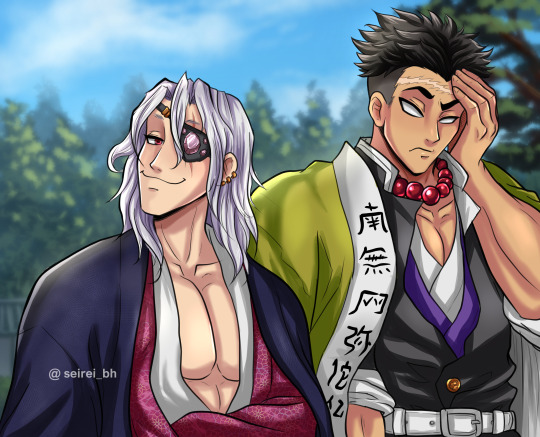
Who's ready for kny Training Arc??
My Twitter
#I had to change Uzui's haori color after the trailer was released XD#it used to be black but the official one is blue#my art#seirei#tengen uzui#gyomei himejima#kny uzui#kny himejima#kimetsu no yaiba#kny training arc
40 notes
·
View notes